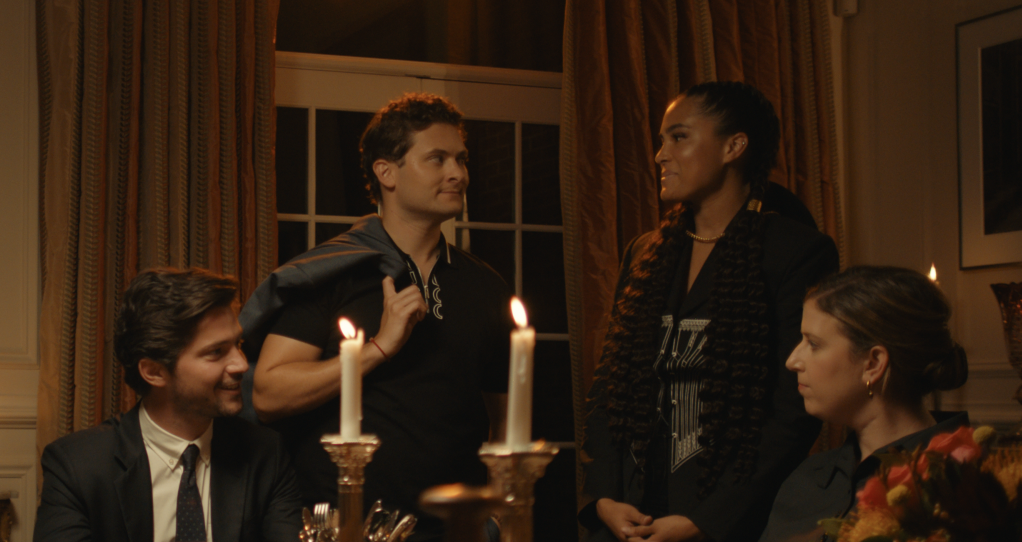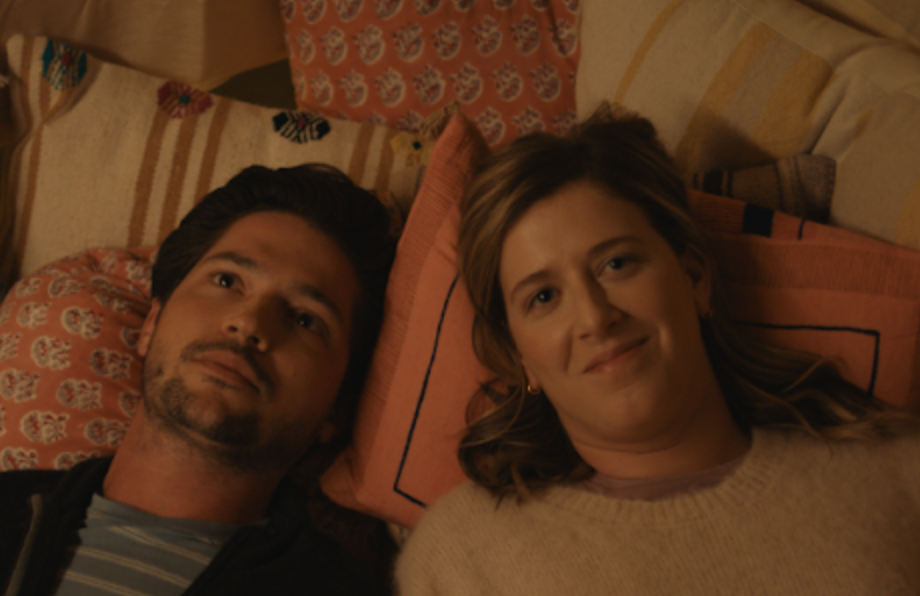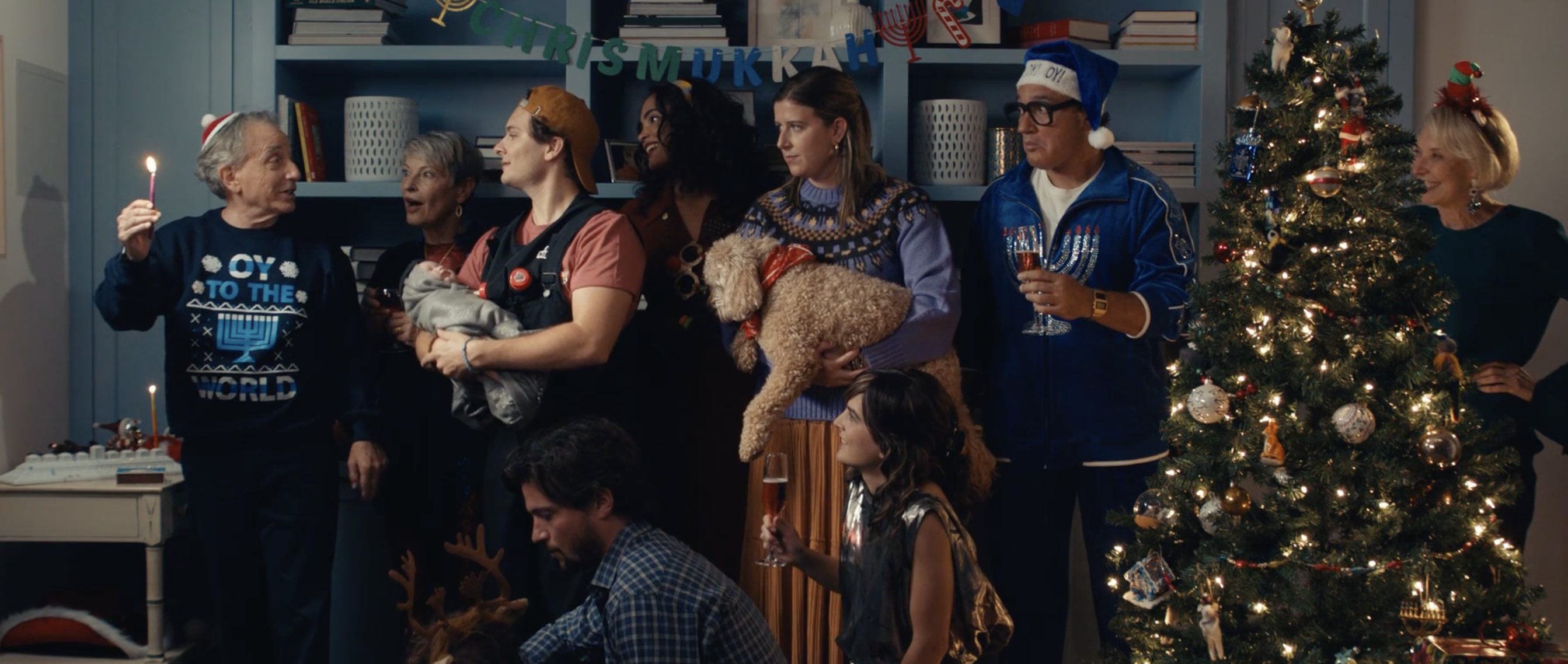Heart-Warming Comedy about Relationships Inspired by Life – Simchas and Sorrows
By Sue Weston and Susie Rosenbluth – Two Sues on the Aisle
Love, family, and acceptance are explored in Simchas and Sorrows, a romantic comedy set in Brooklyn Heights where, at least in this film, events unfold in an unconventional order. Jewish Levi (Thomas McDonell) proposes to Catholic-raised Agnes (Genevieve Adams, who is also the film’s writer and director), the love of his life. She responds. It doesn’t hurt that they’ve just discovered she’s pregnant.
The proposal is photographed, and Levi’s family, thrilled at the prospect of welcoming a daughter-in-law and new grandchild, join the young couple in a race against time. Which will come first: her conversion or the birth of the baby.
Depending on your perspective, Simchas and Sorrows is either a heart-warming exploration into the complexities of interfaith unions, because things are not always as they appear, especially without conversations; or it is a statement on how assimilation, intermarriage, and the compulsion to be “woke” has interfered with traditional Judaism in the United States.
The film hits home by exploring Jewish identity, the fears of antisemitism, and the losses suffered in the Holocaust. Some viewers will agree it demonstrates how to move forward without forgetting the past. Others will say that, taken to its logical conclusion, the film’s details will result in the end of Jewish identity as anything more than cute nostalgic customs coupled with a left-wing political agenda.
Marriage Changes Everything
In the film, Levi pressures free-spirited, atheistic, if somewhat superstitious Agnes to study for conversion, mostly, it seems, to avoid being ostracized by his family. Because she hasn’t outright balked, he stresses that conversion will make their baby Jewish, part of the tribe. Simultaneously, his brother is racing to the altar, fast-tracking his pretentious girlfriend’s conversion. Their civil ceremony and wedding–executed in rapid succession–place further pressure on Levi and Agnes.
Part of the film’s confusion is the importance Levi’s father (Chip Zien) seems to place on conversion for reasons halachic Judaism rejects. The film shows him putting on tallis and tefillin every morning, the implication being that he and his wife are New York Orthodox Jews. Is this a new turn of events for them? The film doesn’t tell us. Were Levi or his brother sent to Jewish day schools? Were the boys raised with religious fervor and, somewhere along the line, rejected it? The film makes no mention of any of this. Levi and his brother are presented as if they had grown up in a home far removed from parents for whom, it now seems, Judaism means everything.
The film suggests that if Levi had spoken with his father sooner, the pressure on Agnes could have been avoided. Fortunately (for the couple), the conversation finally takes place as his father, taking off his tefillin, expresses his unconditional love and acceptance for Agnes, welcoming her to the family, with no strings attached–which for those immersed in the tradition as well as the community, makes no sense at all.
Importance of Conversations and Understanding
Simchas and Sorrows explores the many faces of being Jewish, ranging from being deeply observant to coming in as converts (including those who will not be accepted as Jews in Israel) and the non-traditional such as Rabbi Cohen (Hari Nef), a woman rabbi who runs a conversion course–some might call it a conversion mill. Her Yom Kippur sermon calls for the acceptance of all people: “Everyone in this room has something that could be used against her – whether it’s her gender, her sexual orientation, her skin color, a mental disorder, a physical disability – everybody has something. So, I’m asking you, today, to open your hearts, and your minds, and to beg you not to sacrifice yourselves, your friends, your family, or your community on the altar of ideology.” Not the typical drasha (and certainly one the traditional community would take issue with, especially if such “acceptance” means “who is a Jew”), but Rabbi Cohen is anything but traditional–and it’s nothing less than shocking that Levi could think a conversion conducted by her would be accepted by his parents or their community and that his child with such a convert would be considered Jewish by the people he wants to do all this for.
The depth of misunderstanding is shown when an unnamed, frightened Orthodox family scurries in the shadows of a Brooklyn street, calling Agnes a shiksa. The film’s point seems to be that without conversations, our differences turn into fear, creating distrust. Members of the Orthodox community would point out that, no matter how the unnamed family felt, such name-calling would be not only repugnantly rude but also anti-halachic. It’s a scene taken to promote the film’s–and Rabbi Cohen’s–essentially anti-Orthodox perspective.
The film’s point is that too often important, truth-revealing conversations come too late or not at all. Agnes’ grandfather (John Cullum), who raised her like a daughter, kept his secret hidden, revealed only in a note to her after his death.
Simchas and Sorrows Create Connections
One of the film’s points is the undeniable fact that simchas and sorrows can bring people together. Whether motivated by psychological safety or fear of rejection, all of us risk putting up barriers. Gathering as a family provides a connection. Levi’s grandmother’s death reunites Agnes with her bashert and turns the competition with her sister-in-law into a friendship.
Sadly, Agnes’ grandfather passes away alone; there is no family, no memorial, and Agnes grieves alone.
Simchas are celebrations marking milestones that bring families together, making memories to be savored.
Inspired by Life
Genevieve Adams’ inspiration for the film came from her life, proving that reality can be stranger than fiction. Adams, like her heroine, a product of Catholic schools-turned-self-described atheist, was forced to adopt a Jewish identity when her then soon-to-be husband, Ben, proposed. She had a checkered past, including a maternal grandfather who had changed his name from Rosenbaum to Rand to become an actor. Ben enrolled them in a Judaism 101 class, where the teacher–the inspiration for Rabbi Cohen–was conducting her very first program; she was young, eager, intelligent, funny, and openly gay.
Adams graduated from Dartmouth with a BA in English Literature and a passion for improvisational theater. She appeared in A Walk Among the Tombstones (2014), Money Monster (2016), and How to Be Single (2016). She wrote, produced, and starred in I’m Obsessed With You (But You’ve Got To Leave Me Alone). Simchas and Sorrows is her directorial debut.
Adams creates characters who are real and relatable, exposing their vulnerabilities, which adds to the movie’s appeal–or makes you wish you could redirect them, especially at the end. Levi’s father is proud of both his sons who vie for affection, treading lightly over missteps from youthful indiscretions, although some viewers will wish the father himself had made other choices, which might have given his sons a different perspective on their own options. Humans make mistakes and desperately need acceptance; but if the acceptance comes at a price that can’t be swallowed, everyone–including the community at large–loses. Adams shows the depth of connections and ends with what some will consider a message of hope and others will see as the harbinger of danger that the current generation of the family avoided almost by a deus ex-machina.
Laughter is the Best Medicine
Simchas and Sorrows is undeniably entertaining, quirky, and unconventional. Some will consider it uplifting in the way it challenges many social misconceptions and concludes that religion (any religion) offers stability, providing paths to cope with the stressors of life. Others will argue that accepting “any religion” is not a formula for Jewish continuation.
Some will see the film as promoting the concept that understanding and acceptance create sustainable relationships, blending the essence together, like the celebration of Chanukah and Christmas, into “Chrismukkah,” because, as Agnes points out, the Christmas tree has no religious significance; it is just a marketing-created gifting event. Others will quake with trepidation at the very idea, recognizing that such “blending” has historically spelled disaster for the Jewish people.
***
Two Sues on the Aisle bases its ratings on how many challahs (1-5) it pays to buy (rather than make) in order to see the play, show, film, or exhibit being reviewed.
Simchas and Sorrows received a 4-Challah rating from one of us and a 3-Challah rating from the other.
Four Challah Rating








